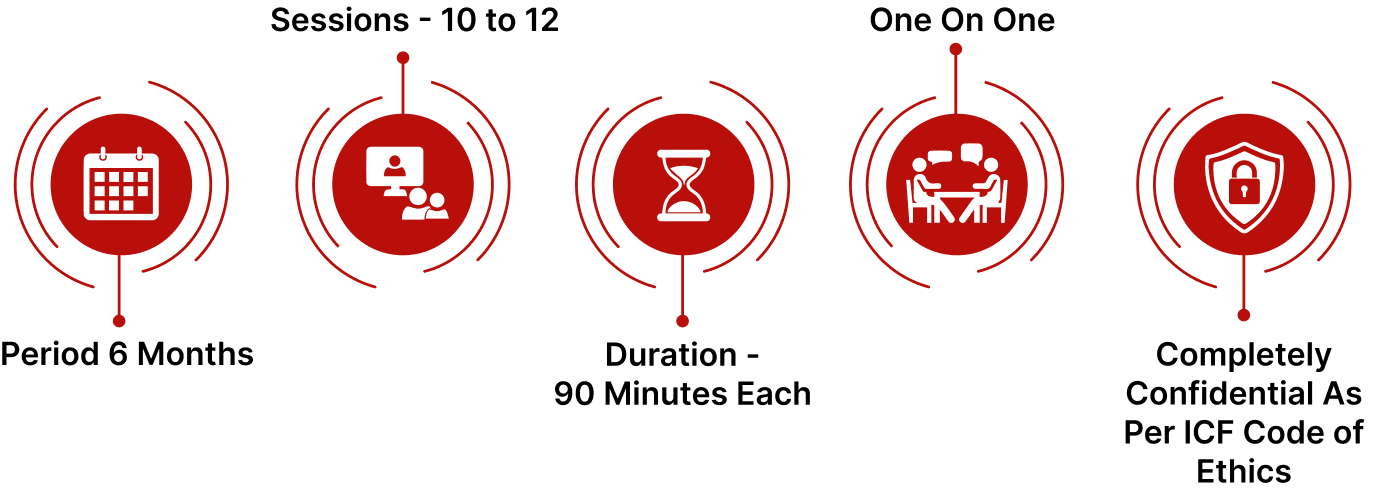
Coaching is the process where the Coach partners with the client in a thought-provoking and creative process that inspires them to maximize their personal and professional potential. Coaching often unlocks previously untapped sources of imagination, productivity, and leadership. We all have goals we want to reach, challenges we are striving to overcome, and times when we feel stuck. Partnering with a coach can change your life, leading you to greater personal and professional fulfilment.
During a coaching conversation, the coach guides the coachee through a process of powerful questioning, deep listening, and reflection. The coach creates a safe space for the coachee to connect with their inner brilliance, natural strengths, and values. This allows the coachee to discover a path that is uniquely theirs.
The fundamental belief in coaching is that individuals possess the inner ability to discover solutions to their challenges and only require someone to assist in the process of uncovering them.
If you are looking to make significant changes in your life and tap into your full potential, a life coach can be a valuable resource. A skilled life coach can guide you in the right direction and provide support as you work towards your personal and professional goals.
If you find yourself feeling stuck in aspects of your life such as work, marriage, love, divorce, and more and are unable to move forward to the next level, then it may be time to consider seeking the guidance of a life coach. Coaching can provide you with a mechanism and process for navigating through these changes and challenges and finding a healthy way forward.
A great coach can help you reach your full potential in many ways, such as:
A coach creates a safe and accepting environment for both themselves and their client. Through the Coaching Conversation, they help their client discover and reconnect with their inner-most truths about their qualities, gifts, and life purpose. The coach also assists the client in aligning their everyday decisions and actions with their innermost truths.
To raise the consciousness of the client, the coach asks questions that help them choose what they want, what they are willing to do, and what they are ready to commit to in the present moment.
Therapy usually concentrates on helping people heal from past experiences and addressing their feelings. On the other hand, coaching emphasizes the client creating their future from the present moment, taking action, and moving forward towards their desired goals, aspirations, or needs for fulfilment. It is important to note that coaching cannot and should not replace therapy. Coaches are not trained to serve as therapists.
Mentoring involves using the mentor’s own experience in dealing with similar challenges to advise the client. Coaching, on the other hand, believes that every individual has the ability to find solutions to their challenges themselves. The coach just needs to help the client discover and uncover those solutions.
In coaching, the client is always in charge of setting the agenda. The coach holds no bias towards the client’s agenda and approaches every session with a learner’s mindset.
Consulting involves a subject matter expert providing answers based on their knowledge and experience. The consultant assesses the situation and offers the most appropriate solution. On the other hand, coaching is a process where the coach believes that the client holds the answers within themselves. The coach helps the client access their inner truth to find the most effective solution for their situation. In consulting, the client must review, approve, and implement the consultant’s work. In coaching, the client is responsible for creating progress.
Both Life Coaching and Leadership Coaching work on the same fundamental premise of improving skills and achieving objectives. However, the difference between the two lies in the client’s agenda.
Life coaching is primarily aimed at addressing personal life agendas. People seek life coaching to improve their relationships, find balance, and build positivity in their personal lives. Success in life coaching is measured by the level of happiness and fulfilment a client achieves in their personal life, although it often has a deep connection and impact on their professional life as well.
On the other hand, leadership coaching is focused on leaders or leadership. An individual client or a team seeks help from a coach to achieve their goals and become more effective professionals. The agenda in leadership coaching is linked primarily to professional, organizational, team, or leadership goals. Although this is often intertwined with the client’s personal life, the primary focus is on the professional aspect.
Group coaching is a coaching process in which a coach works with multiple individuals who share a common interest, but not necessarily the same goal. For instance, a group of people might come together to receive coaching on leadership. Each individual would then apply the new skills or mindset they acquire towards their own unique challenges and goals. This approach allows individuals to benefit from both the coach’s guidance and the support of the group.
Team coaching is a process where a coach works with a team to enhance its productivity and effectiveness. It is often done with leadership teams and focuses on engagement as well. The coaching exercise is a bit more intricate as it deals with individuals, their relationships, and the team, all at the same time. However, in every other way, team coaching and individual coaching require the same skills and follow the same standards of confidentiality.
A team is defined as a group of people who are aligned and committed to a common goal or outcome, such as the successful completion of a new business project.